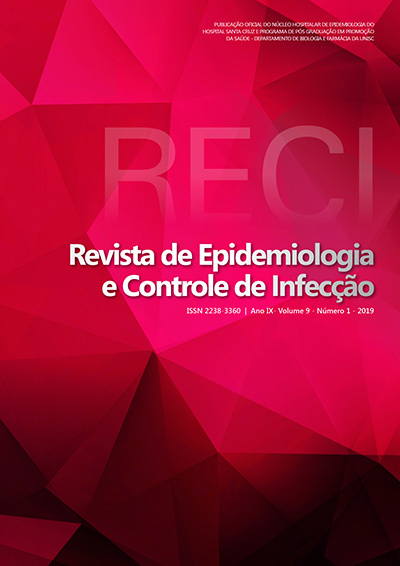Relación entre el estado nutricional, nutrición precoce, hiperglicemia y desempeño clínico de pacientes internados en una unidad de terapia intensiva
DOI:
https://doi.org/10.17058/reci.v9i1.11689Resumen
Justificación y objetivos: La oferta de nutrientes en el momento adecuado, puede minimizar los efectos del catabolismo exacerbado, mejorando la evolución clínica del paciente. Por eso, el objetivo de este estudio fue evaluar y relacionar el estado nutricional, nutrición precoz e hiperglucemia con el desenlace clínico de pacientes críticos internados en una unidad de terapia intensiva. Métodos: Se trata de un estudio de cohorte prospectivo, con pacientes críticos de un hospital del interior del estado de Rio Grande do Sul, de ambos sexos, con edad superior a 20 años. En el presente estudio se analizaron los resultados obtenidos en el análisis de los resultados de la evaluación de la glucosa en el momento de la evaluación de la glucemia, la aplicación de la insulina, las complicaciones clínicas, los días de la terapia de la dieta, la internación y el desenlace clínico. La glucosa y la vía de la dieta fueron acompañadas durante 72 horas de internación. Resultados: Participaron del estudio 66 pacientes, con promedio de 64,08 ± 16,11 años, 59,1% eran del sexo masculino, hubo predominio de sobrepeso (59,1%) y 48,5% internaron por algún evento cardiovascular. En las 24 horas de internación el 15,2% de los individuos eran hiperglucémicos, seguido del 21,2% en las 48 horas y el 19,7% en las 72 horas. Se observó una asociación entre el desenlace clínico de los pacientes y la nutrición precoz en hasta 48 horas (p = 0,004), así como infección (p = 0,036) y los tipos de vias alimentarias utilizadas en las primeras 48 horas (p = 0,002) 72 horas (p=0,001). Conclusiones: La terapia nutricional precoz influye directamente en el desenlace clínico de pacientes críticos, presentándose como un riesgo a la vida.Descargas
##submission.downloads##
Publicado
Cómo citar
Número
Sección
Licencia
The author must state that the paper is original (has not been published previously), not infringing any copyright or other ownership right involving third parties. Once the paper is submitted, the Journal reserves the right to make normative changes, such as spelling and grammar, in order to maintain the language standard, but respecting the author’s style. The published papers become ownership of RECI, considering that all the opinions expressed by the authors are their responsibility. Because we are an open access journal, we allow free use of articles in educational and scientific applications provided the source is cited under the Creative Commons CC-BY license.


